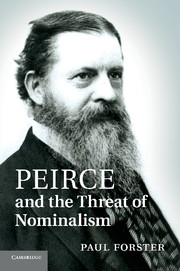Book contents
- Frontmatter
- Contents
- Preface
- List of abbreviations
- 1 Nominalism as demonic doctrine
- 2 Logic, philosophy and the special sciences
- 3 Continuity and the problem of universals
- 4 Continuity and meaning: Peirce's pragmatic maxim
- 5 Logical foundations of Peirce's pragmatic maxim
- 6 Experience and its role in inquiry
- 7 Inquiry as self-corrective
- 8 Theories of truth: Peirce versus the nominalists
- 9 Order out of chaos: Peirce's evolutionary cosmology
- 10 A universe of chance: foundations of Peirce's indeterminism
- 11 From inquiry to ethics: the pursuit of truth as moral ideal
- Bibliography
- Index
6 - Experience and its role in inquiry
Published online by Cambridge University Press: 28 April 2011
- Frontmatter
- Contents
- Preface
- List of abbreviations
- 1 Nominalism as demonic doctrine
- 2 Logic, philosophy and the special sciences
- 3 Continuity and the problem of universals
- 4 Continuity and meaning: Peirce's pragmatic maxim
- 5 Logical foundations of Peirce's pragmatic maxim
- 6 Experience and its role in inquiry
- 7 Inquiry as self-corrective
- 8 Theories of truth: Peirce versus the nominalists
- 9 Order out of chaos: Peirce's evolutionary cosmology
- 10 A universe of chance: foundations of Peirce's indeterminism
- 11 From inquiry to ethics: the pursuit of truth as moral ideal
- Bibliography
- Index
Summary
Peirce's discussion of the meaning of symbols helps clarify what is at stake in his debate with the nominalist. As he sees it, the central issue is whether the continuity presupposed by the laws affirmed in symbols is real. While this is a question of ontology, he thinks it is settled by appeal to experience, like any other scientific question. However, on his theory of symbols it is unclear how experience might lead an inquirer to credible beliefs about which – or indeed whether any – laws obtain. According to the pragmatic maxim, a proposition like ‘The Kohinoor diamond is hard’ means that ‘If a scratch test were performed on the Kohinoor diamond, it would remain unmarked in every case.’ Peirce thinks an inquirer can reasonably judge this to be the case only given evidence supplied by scratch tests (carried out on this or other diamonds). However, any judgement about the results of any such test – for example, ‘The Kohinoor diamond passed a scratch test on 15 January 2010’ – also implies a law, a law to the effect that if certain actions indicating that the Kohinoor diamond passed a scratch test on this date were performed, certain practical effects would result. To affirm this law an inquirer would seem to require evidence provided by experimental tests that pertain to it.
- Type
- Chapter
- Information
- Peirce and the Threat of Nominalism , pp. 108 - 129Publisher: Cambridge University PressPrint publication year: 2011



